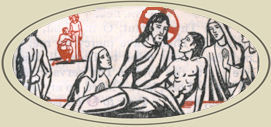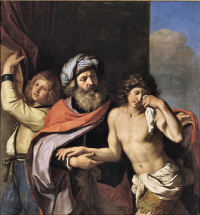Ordinary Time: September 17th
Twenty-Fourth Sunday of Ordinary Time
» Enjoy our Liturgical Seasons series of e-books!
His master summoned him and said to him, ‘You wicked servant! I forgave you your entire debt because you begged me to. Should you not have had pity on your fellow servant, as I had pity on you?’ Then in anger his master handed him over to the torturers until he should pay back the whole debt. So will my heavenly Father do to you, unless each of you forgives your brother from your heart (Mt 18:32-35).”
The feast of St. Robert Bellarmine, which is ordinarily celebrated today, is superseded by the Sunday liturgy.
Click here for commentary on the readings in the Extraordinary Form of the Roman Rite.
Sunday Readings
The first reading is taken from the Book of Sirach 27:30, 28:7. In the verses read today, Sirach tells us that we must forgive our neighbor if we want God to forgive us our own sins. We must be merciful if we hope to obtain mercy from God. We must not seek revenge on a neighbor lest God should take vengeance on us. If we remember our end in life we will keep God's commandments and we will not be angry with a neighbor who offends us.
The second reading is from the St. Paul to the Romans 14:7-9. In these three verses St. Paul emphasizes the fact that through our baptism we have been made members of Christ's mystical body, we have become brothers of Christ, intimately united with him in his death and resurrection. Whether living or dead we belong to Christ. It was for this purpose, to unite all men closely to himself not only in this life but especially in the next, that Christ became man and "dwelt among us."
The Gospel is from St. Matthew 18:21-35. On reading or hearing this story of the merciless servant, each one of us would rightly judge him a mean, low type of man, a heartless man, who puts himself outside the pale of mercy. He throttled his fellow-servant for a paltry debt of ten dollars, and would not listen to the poor man's plea for mercy. When we hear what the king did to this heartless servant we heartily approve and say: "It served him right, he got what he richly deserved."
We had better stop and think for a moment today and reflect that we ourselves may be that merciless servant described in the parable. Every time we have sinned mortally we have incurred an unpayable debt to God. Each time we have received absolution we have come out of God's courtroom as free men. A weight greater than a million dollar debt has been lifted from our shoulders. A fate worse than generations of earthly imprisonment — that is, eternal slavery — has been spared us because of God's loving, infinite mercy. How then can it happen that we could be so heartless, mean, and foolish as to refuse to forgive a neighbor for some offense he has committed against us?
Yet it happens, and it may be that there are some among us here today who continue to have enmity in their hearts against neighbors who offended them. In their hard-heartedness they cannot get themselves to forgive and forget. Are these not following in the footsteps of the merciless servant? Will they not receive the punishment of the merciless servant — a punishment richly deserved? This will be the fate of all unforgiving Christians; they will meet an unforgiving God when they are called to settle their accounts.
That day has not yet come for us. We still have time to put our affairs in order. We still can forgive all our enemies from our heart. If we do not, we are cutting ourselves off from the possibility of having our own sins and offenses forgiven by God. We have the solemn word of our divine Lord for this in the lesson he draws from the parable "So also my heavenly Father will do to every one of you (that is, deliver us up to eternal slavery) if you do not forgive your brother from your heart."
Excerpted from The Sunday Readings by Fr. Kevin O'Sullivan, O.F.M.
 Commentary on the Readings for the Fifteenth Sunday after Pentecost
Commentary on the Readings for the Fifteenth Sunday after Pentecost
"'Young man, I say to thee, arise.' And he who was dead . . . began to speak. And (Jesus) gave him (to his mother" (Gospel).
Holy Mother Church, like unto "a widow," weeps for the return of every sinner (figure in background) as if for an "only child"; that the Christ-Life might return to the godless, to the apostate.
"I say to thee, arise." Though alive we may be dead! Go to Him in prayer, "morning" and "night" (Gradual); and in the Sacraments also, that His Life-giving "graces" may save us from our death-dealing "inclinations" (PostCommunion).
"While we have time, let us do good to all men," that they, too, may be reborn, renewed in this Christ-Life. "Instruct . . . (one who is) doing something wrong . . . Bear one another's burdens, and so you will fulfill the law of Christ" (Epistle).
Excerpted from My Sunday Missal, Confraternity of the Precious Blood






